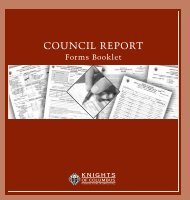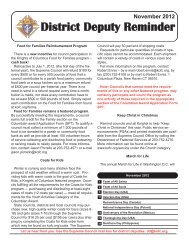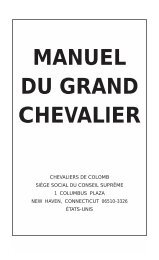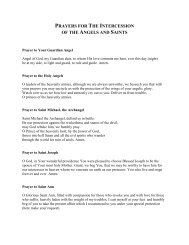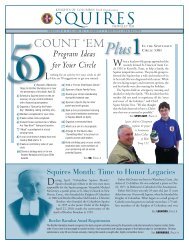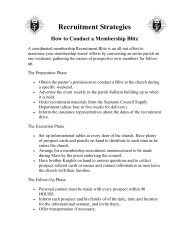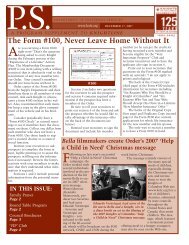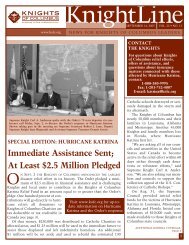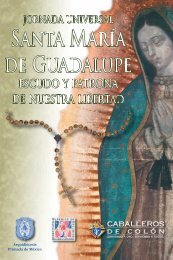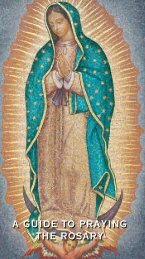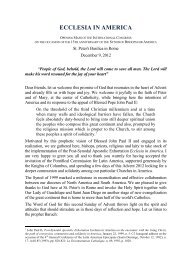CATHOLIC WORD BOOK - Knights of Columbus, Supreme Council
CATHOLIC WORD BOOK - Knights of Columbus, Supreme Council
CATHOLIC WORD BOOK - Knights of Columbus, Supreme Council
You also want an ePaper? Increase the reach of your titles
YUMPU automatically turns print PDFs into web optimized ePapers that Google loves.
the pastoral direction <strong>of</strong> a bishop as local<br />
Ordinary.<br />
Discalced: Of Latin derivation and<br />
meaning without shoes, the word is<br />
applied to religious orders or<br />
congregations whose members go barefoot<br />
or wear sandals.<br />
Disciple: A term used sometimes in<br />
reference to the Apostles but more <strong>of</strong>ten to<br />
a larger number <strong>of</strong> followers (70 or 72) <strong>of</strong><br />
Christ mentioned in Lk 10:1.<br />
Disciplina Arcani: A Latin phrase, meaning<br />
discipline <strong>of</strong> the secret and referring to a<br />
practice <strong>of</strong> the early Church, especially<br />
during the Roman persecutions, to: (1)<br />
conceal Christian truths from those who, it<br />
was feared, would misinterpret, ridicule<br />
and pr<strong>of</strong>ane the teachings, and persecute<br />
Christians for believing them; (2) instruct<br />
catechumens in a gradual manner,<br />
withholding the teaching <strong>of</strong> certain<br />
doctrines until the catechumens proved<br />
themselves <strong>of</strong> good faith and sufficient<br />
understanding.<br />
Dispensation: The relaxation <strong>of</strong> a law in a<br />
particular case. Laws made for the common<br />
good sometimes work undue hardship in<br />
particular cases. In such cases, where<br />
sufficient reasons are present, dispensations<br />
may be granted by proper authorities.<br />
Bishops, religious superiors and others may<br />
dispense from certain laws; the pope can<br />
dispense from all ecclesiastical laws. No<br />
one has authority to dispense from<br />
obligations <strong>of</strong> the divine law.<br />
Divination: Attempting to foretell future<br />
or hidden things by means <strong>of</strong> things like<br />
dreams, necromancy, spiritism,<br />
-26-<br />
examination <strong>of</strong> entrails, astrology, augury,<br />
omens, palmistry, drawing straws, dice,<br />
cards, etc. Practices like these attribute to<br />
created things a power which belongs to<br />
God alone and are violations <strong>of</strong> the First<br />
Commandment.<br />
Divine Praises: Fourteen praises recited or<br />
sung at Benediction <strong>of</strong> the Blessed<br />
Sacrament in reparation for sins <strong>of</strong><br />
sacrilege, blasphemy and pr<strong>of</strong>anity. Some<br />
<strong>of</strong> these praises date from the end <strong>of</strong> the<br />
18th century: Blessed be God. / Blessed be his<br />
holy Name. / Blessed be Jesus Christ, true God<br />
and true Man. / Blessed be the Name <strong>of</strong> Jesus. /<br />
Blessed be his most Sacred Heart. / Blessed be his<br />
most Precious Blood. / Blessed be Jesus in the most<br />
holy Sacrament <strong>of</strong> the Altar. / Blessed be the Holy<br />
Spirit, the Paraclete. / Blessed be the great<br />
Mother <strong>of</strong> God, Mary most holy. / Blessed be her<br />
holy and Immaculate Conception. / Blessed be her<br />
glorious Assumption. / Blessed be the name <strong>of</strong><br />
Mary, Virgin and Mother. / Blessed be St.<br />
Joseph, her most chaste Spouse. / Blessed be God<br />
in his Angels and in his Saints.<br />
Double Effect Principle: Actions sometimes<br />
have two effects closely related to each<br />
other, one good and the other bad, and a<br />
difficult moral question can arise: Is it<br />
permissible to place an action from which<br />
two such results follow? It is permissible<br />
to place the action, if: the action is good in<br />
itself and is directly productive <strong>of</strong> the good<br />
effect; the circumstances are good; the<br />
intention <strong>of</strong> the person is good; the reason<br />
for placing the action is proportionately<br />
serious to the seriousness <strong>of</strong> the indirect<br />
bad effect.<br />
Doxology: (1) The lesser doxology, or<br />
ascription <strong>of</strong> glory to the Trinity, is the<br />
Glory be to the Father. The first part dates



